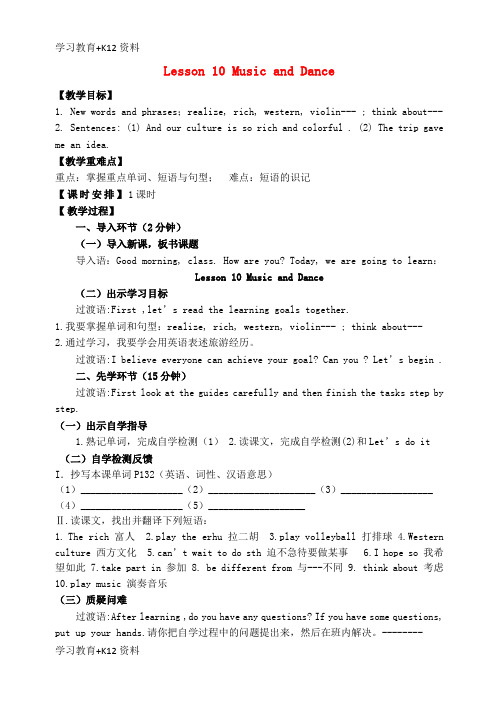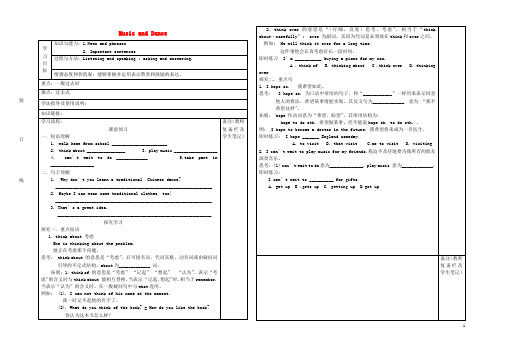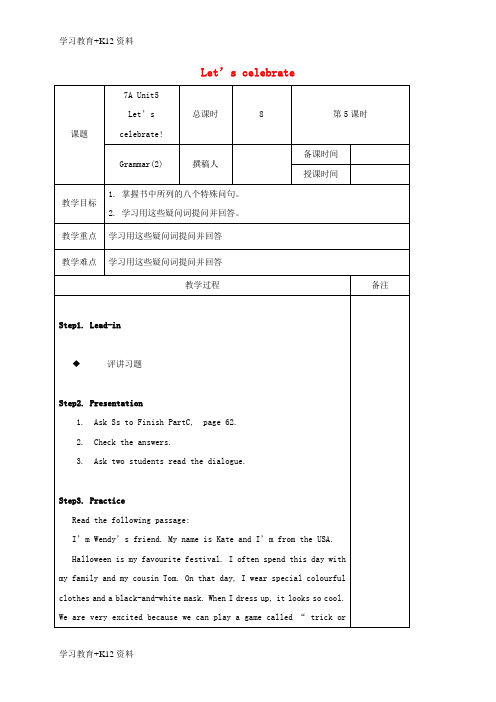【小初高学习]2016-2017学年七年级英语下册 Unit 2 Im going to stud
- 格式:doc
- 大小:22.00 KB
- 文档页数:3

Lesson 10 Music and Dance【教学目标】1.New words and phrases;realize, rich, western, violin--- ; think about---2.Sentences: (1) And our culture is so rich and colorful . (2) The trip gave me an idea.【教学重难点】重点:掌握重点单词、短语与句型;难点:短语的识记【课时安排】1课时【教学过程】一、导入环节(2分钟)(一)导入新课,板书课题导入语:Good morning, class. How are you? Today, we are going to learn:Lesson 10 Music and Dance(二)出示学习目标过渡语:First ,let’s read the learning goals together.1.我要掌握单词和句型:realize, rich, western, violin--- ; think about---2.通过学习,我要学会用英语表述旅游经历。
过渡语:I believe everyone can achieve your goal? Can you ? Let’s begin .二、先学环节(15分钟)过渡语:First look at the guides carefully and then finish the tasks step by step.(一)出示自学指导1.熟记单词,完成自学检测(1)2.读课文,完成自学检测(2)和Let’s do it (二)自学检测反馈I.抄写本课单词P132(英语、词性、汉语意思)(1)____________________(2)_____________________(3)__________________ (4)____________________(5)___________________Ⅱ.读课文,找出并翻译下列短语:1.The rich 富人2.play the erhu 拉二胡3.play volleyball 打排球4.Western culture 西方文化5.can’t wait to do sth 迫不急待要做某事6.I hope so 我希望如此7.take part in 参加8. be different from 与---不同9. think about 考虑10.play music 演奏音乐(三)质疑问难过渡语:After learning ,do you have any questions? If you have some questions, put up your hands.请你把自学过程中的问题提出来,然后在班内解决。
![【小初高学习]2016-2017学年七年级英语上册 Unit 4 My day Welcome to](https://img.taocdn.com/s1/m/b5eabd3890c69ec3d5bb7591.png)


七年级英语下册Unit2知识点Section A1.Get up 起床2.Go to school 去上学3.Get dressed 穿衣服Dress (名词) 连衣裙 (动词) 穿衣服Put on, wear, dress区别:Put on强调穿衣服的动作Eg: It’s cold outside, please put on your sweater.“外面天气冷,请穿上你的毛衣。
”wear强调穿衣服的状态Eg: The girl wears a sweater today.“这个女孩今天穿了一件毛衣。
”Dress 后面接人,表示给某人穿衣服Eg: The boy is too young to dress himself.“这个小那还太小了不能自己穿衣服。
”4.Brush teeth 刷牙(1)Brush (名词) 刷子Eg: Please pass the brush to me.“请把刷子递给我。
”Brush(动词) 刷Eg: The floor is easy to brush clean.“这个地板很容易刷干净。
”(2)Teeth 是tooth(牙齿)的复数形式5.Eat breakfast/lunch/dinner “吃早/午/晚饭”= have breakfast/lunch/dinner注意:在表示吃早午晚饭时不可加冠词,但当有形容词修饰早午晚饭时可加冠词Have a good breakfast“吃一顿好的早饭”句型:have ... for breakfast/lunch/dinner“早/午/晚饭吃...”Eg: We have bread and milk for breakfast.“我们早饭吃面包和牛奶。
”6.Take a shower= have a shower 洗淋浴7.At six thirty 在六点半在具体某一时刻前通常用介词 at时间表达法:1)采用数词表达时间Eg: six thirty 六点半;eight fifteen 八点十五分2)采用介词past,to表达时间一般说来半个小时以内,常常用介词past,表示“几点过几分”Eg: a quarter past three 三点一刻;half past eight 六点半;ten past two 两点十分半小时过后多用介词to,表示“差几分到几点”Eg: a quarter to three 两点四十五;twenty to four 三点四十3)a. m. 和p. m.A.m. 表示“午前;上午”(午夜12:00后至中午12:00前);p.m. 表示“午后;下午”(中午12:00后至午夜12:00前)。

七年级下册M1U2课文翻译Unit12d:Jane: 你好,鲍勃,你想加入什么俱乐部?Bob:我想加入运动俱乐部。
Jane:棒极了!你会玩什么运动?Bob:足球.Jane:这么说你可以加入足球俱乐部。
Bob:那么你呢?你非常善长讲故事.你可以加入讲故事俱乐部。
Jane:听起来不错。
但我也喜欢画画。
Bob:那就加入两个俱乐部,讲故事俱乐部和美术俱乐部!Jane:好的,让我们现在去加入吧!Section B2a:1.你好,我是 Peter,我喜欢打篮球。
我会说英语,我也会踢足球。
2.你好,我是 Ma Huan,我会打乒乓球和下国际象棋。
我喜欢与人们交谈和做游戏。
3.我的名字是 Alan。
我在学校音乐俱乐部。
我会弹吉他和钢琴。
我也会唱歌和跳舞。
2b:(A)我们老人之家需要帮助。
在七月份你有空吗?你善于与老人相处吗?你会与他们说话做游戏吗?他们会给你讲故事,你们可以交朋友。
它既有趣又好玩!请在今天拨打电话698-7729与我们联系。
(C)放学后你忙吗?不忙?你会说英语吗?是吗?那么,我们需要你帮助说英语的学生做运动。
这事轻松的,容易的!请来学生运动中心吧。
拨打电话293-7742联系 Mr.Brown.(B)你会弹钢琴或者拉小提琴吗?在周末你有时间吗?学校需要帮助教音乐。
它不难!拨打电话555-3721联系 ler.Unit2 翻译课文2d:Interviewer :Scott 有一份有趣的工作。
他在一家广播电台工作。
Scott,你的广播节目在几点?Scott:从晚上十二点到早上六点。
Interviewer :你通常几点起床?Scott:晚上八点半。
然后我九点吃早饭。
Interviewer :那是个有趣的早饭的时间。
Scott:是的。
之后,我通常在十点二十左右锻炼。
Interviewer :你什么时候去上班?Scott:在十一点,所以我工作从不迟到。
2b:你好,我是 Tony,我不喜欢早起床。
在早上,我八点起床。

人教七年级下册英语unit2知识点总结Unit 2知识点总结Unit 2主要介绍了有关学校和课程的相关话题,包括学科名称、教室设施、课程时间和日常学习及校外活动等内容,下面我们来一一进行总结。
一、学科名称1. 英语 - English2. 数学 - Math3. 历史 - History4. 科学 - Science5. 美术 - Art6. 音乐 - Music7. 体育 - P.E.8. 计算机 - Computer Science二、教室设施1. 黑板 - blackboard2. 白板 - whiteboard3. 投影仪 - projector4. 音响 - sound system5. 地图 - map6. 水龙头 - tap7. 电视 - TV8. 电脑 - computer9. 灯 - light10. 窗户 - window三、课程时间1. 上午 - in the morning2. 下午 - in the afternoon3. 晚上 - in the evening4. 早上 - in the early morning5. 夜晚 - at night6. 每周 - every week7. 每天 - every day8. 周末 - on weekends四、日常学习1. 做作业 - do homework2. 练习 - practice3. 复习 - review4. 读书 - read books5. 写作 - write compositions6. 讨论 - have discussions7. 板书笔记 - take notes8. 教师讲解 - teacher's explanation9. 学习笔记 - study notes10. 做练习 - do exercises五、校外活动1. 课外活动 - extracurricular activities2. 运动会 - sports meeting3. 聚会 - party4. 社交活动 - social activities5. 英语角 - English corner6. 爱好小组 - hobby group7. 社团活动 - club activities8. 学校之旅 - school trip以上就是Unit 2的主要内容,希望能够帮助大家更好地学习英语,更好地了解学校和课程的相关话题。
人教版七年级英语单元重点知识点归纳Unit2 What time do you go to school?一、重点词组与句子Section A1.what time几点,什么时候2.go to school去上学3.get up起床4.take/have a shower淋浴,洗澡5.put on穿上,增加6.go to work去上班7.get to到达8. an interesting job 一份有趣的工作9.be late for迟到10.have/eat breakfast 吃早餐11.on weekends 在周末12.get dressed = dress oneself穿上衣服13.brush teeth 刷牙14.at a radio station 在广播电台句子:1.What time is it? 几点了?2.What time do you usually get up?你通常几点起床?3.I usually get up at five o’clock. 通常5点钟起床。
4.-What time does he eat breakfast?他什么时候吃早饭?5.-He eats breakfast at seven o’clock. 他七点钟吃早饭。
Section B1.listen to听2.get back 归还,取回3.get home 到家4.get to 到达5.get for 为某人拿(取)买6.half past six 六点半7..get from 从某人/某物那得到……8.go to bed early早睡9.do (one’s) homework做作业10.go home回家11.take a walk 散步12. either…or…要么……要么……13.lots of 许多,大量14.eat dinner吃晚饭15. eat quickly吃的快16 play sports/games 做运动/游戏17. taste good尝起来不错18.healthy activities 健康的活动19. unhealthy habits 不健康的习惯句子:1.When do students usually eat dinner?学生们通常什么时候吃晚餐?2.I don’t have much time for breakfast.我没有许多时间吃早餐。
Unit 2 What time do you go to school?一、重点词汇(1)重点单词和短语get up起床get dressed穿衣服brush teeth/ brush one’s teeth刷牙eat/have breakfast吃早餐run跑步take a shower洗澡;沐浴go to work去工作at a radio station在广播电台radio show广播节目go to school去上学get to school到达学校have English class上英语课have Music class上音乐课play the guitar弹吉他play basketball打篮球play sports做运动eat/have lunch吃午餐after school放学后after class下课后go home回家eat/have dinner吃晚餐take a walk去散步do one’s homework做某人的家庭作业clean one’s room打扫某人的房间go to bed上床睡觉got to bed early/late睡的早/晚on weekends在周末on weekdays在工作日on school days在学校上课日best friend好朋友/最好的朋友eat ice-cream吃冰淇淋eat vegetables吃蔬菜play computer games玩电脑游戏eat a nice/good breakfast吃一份不错的早餐fruits and vegetables水果和蔬菜(2)about 表示“大约”E.g. She always exercises about seven ten.It’s about 5 kilometers from my home to the school.(3)from...to... “从....到...”E.g. She works from nine a.m. to five p.m. everyday.(4)介词for表示“为了...;对于...”for breakfast/ lunch/ dinnerE.g. I sometimes eat chicken and rice for lunch.Mike eats fruits and vegetables for dinner.(5)after 表动作时间的先后,表示“在...之后”after school/class/lunch/dinnerbefore 表示“在...之前”before breakfast/ lunch/ dinnerE.g. I often play sports before breakfast.Mr. Li usually takes a walk after dinner.(6)much;many;lots of/ a lot of都表示“许多”;区分:much+不可数名词;many+可数名词复数;lots of/ a lot of+可数名词复数/不可数名词E.g. I don’t have much time for breakfast. = I don’t have lots of/ a lot of time for breakfast. (time时间为不可数名词)Linda bought many new pens. = Linda bought lots of/ a lot of new pens. (pen为可数名词)(7)either A or B 表示“要么A要么B”,做主语时,根据就近原则来选择动词形式。